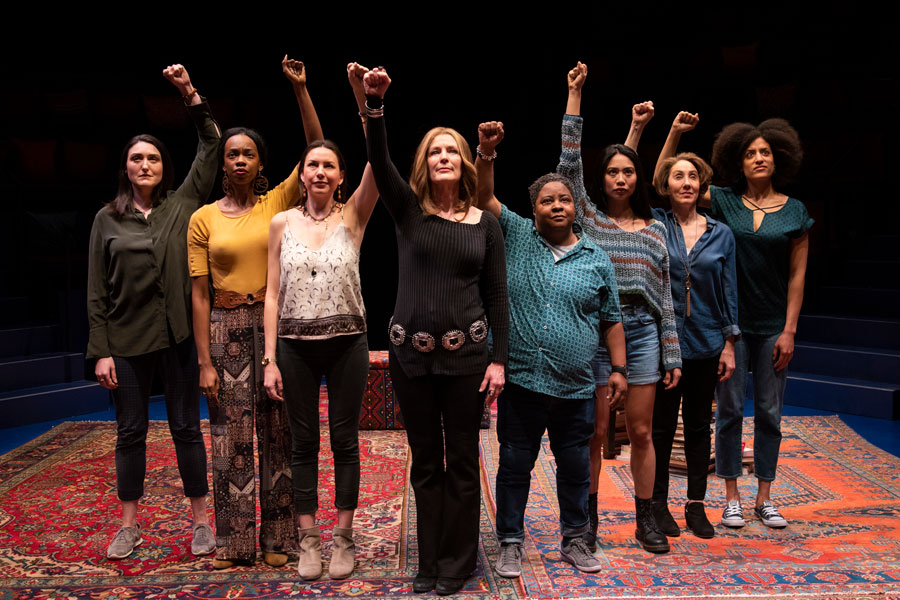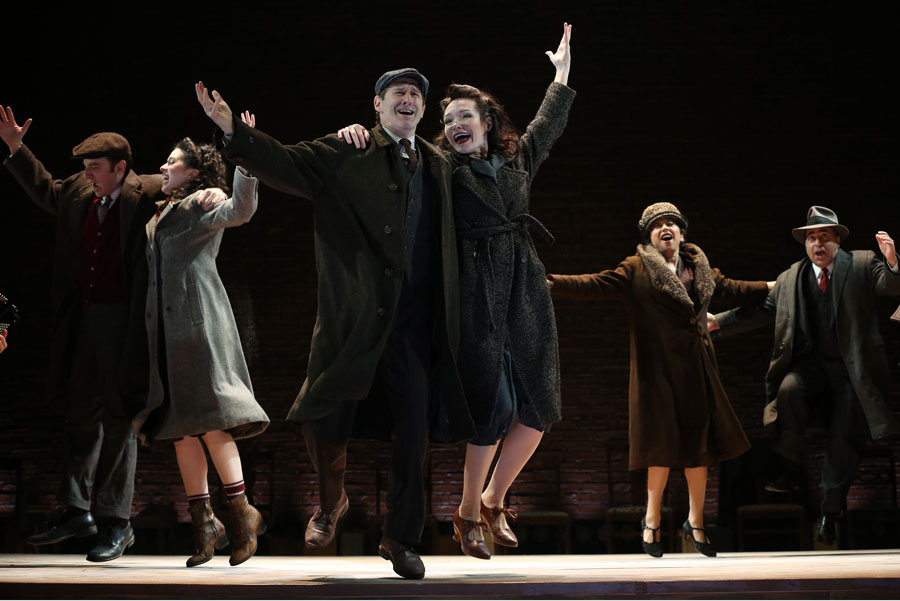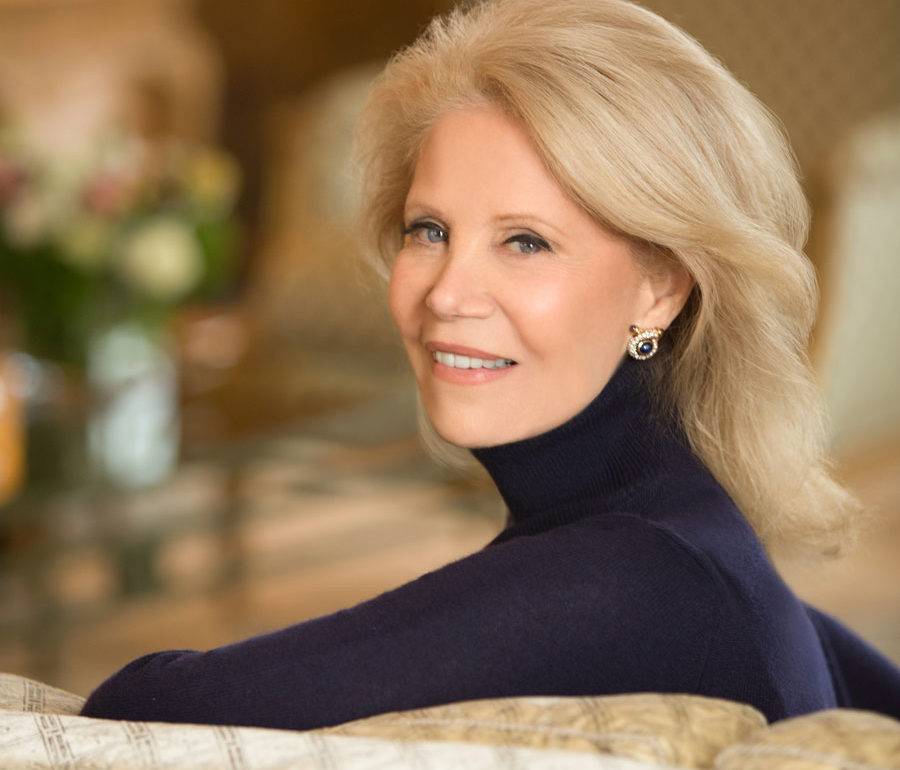It was the table of Tonys that caught my eye. I was sitting in Daryl Roth’s office in midtown Manhattan, a corner location with wrap-around glass windows and an enviable view of Central Park. There’s a small, gold-accented telescope in one corner. And next to Roth’s executive wood desk is a table with 12 Tony Awards lined up in neat symmetry. Not pictured: the seven Pulitzers gathered by plays after she produced them.
Given the accomplishments commemorated in that room, you might expect a towering, Miranda Priestly-like figure. But Roth is soft-spoken and genteel, the stark opposite of the manic high energy of playmakers à la The Producers. Her affability can almost make you forget that this is a person who has been called “one of the most powerful women in theatre” by no less than The New York Times, and who has an Off-Broadway theatre bearing her name (at which Gloria: A Life is playing through March 31). She’s so polite that she asked me if I needed anything to drink, though I was already holding a glass of water in my hand. And when I asked her how long we had to talk, she said, “As long as you need.”
But don’t let the pleasant demeanor fool you. Roth is acutely aware of a few stark realities: that she’s one of the few female producers on Broadway, that the work she chooses (by women, LGBT folks, and people of color) is not usually seen as commercially viable, and that not many people know exactly what a producer does. With 30 years of experience under her belt, she’s used to people, including other artists, thinking a producer just “finds money and your job is done.” She added, accommodatingly, “Which is one way to be a producer.” That’s not the kind of producer she is. “I’ve chosen to be an artistic producer, and very hands-on,” she explained. In her case that means “finding the material I feel very strongly about, and being able to put together a creative team, being able to be involved in every step of the development.”
Her producing career began in 1988 with Closer Than Ever, a musical revue with lyrics Richard Maltby Jr. and music by David Shire, which she first saw in cabaret form in downtown Manhattan, then helped develop at Williamstown Theatre Festival. “It ran for nine months Off-Broadway, which I like to say is the birth of a baby. It was my first theatre baby.”
Since then she’s had many theatre babies. She’s helped develop more than 100 new works both on and Off-Broadway, as well as financing the next life of existing shows. A very short and incomplete list of works of Roth joints includes Kinky Boots, Indecent, Who’s Afraid of Virginia Woolf?, Fuerza Bruta, The Normal Heart, and Love, Loss, and What I Wore.
“I owe my career to her caretaking,” Paula Vogel wrote in an email. Roth produced both Vogel’s Indecent on Broadway in 2017 (which gave Vogel her Broadway debut), as well as How I Learned to Drive Off-Broadway in 1997 (en route to its Pulitzer). Added Vogel, “I respect her. I trust her. And I love her.”
Roth is also the kind of civically engaged New Yorker who sits on the board of the New York City Police Foundation, Lincoln Center Theater, and NYC Mayor Bill de Blasio’s Theater Subdistrict Council (where she recently help oversee an initiative that gave away $1.5 million to female-led artistic projects). Oh, and she’s also a Tony Awards voter.
The Daryl Roth Theatre off Union Square is a two-theatre complex Roth both rents out and uses as a playhouse for work she develops. Gloria: A Life began when feminist icon Gloria Steinem came to Roth looking for a female producer to help develop a one-woman show. Roth connected her with Emily Mann, who wrote the play, which has been playing to full houses since last October. Next at the theatre will be Accidentally Brave, written and performed by Maddie Corman (running March 11-July 14).
“I’ve never watched the creation of a play before,” Steinem wrote in an email. “I’m knocked out by the talent and hard work of women whose the lifeblood of the theatre, yet whose talent and work the theatre often neglects.”

Producing is something of a second career for Roth, who hails from a family in Wayne, N.J., for whom theatregoing was a regular pastime. Eventually she moved to Manhattan, married Steven Roth (chairman of Vornado Realty Trust), opened an interior-decorating business, and raised two kids (“I remember sewing costumes for The Mikado when [my son] Jordan was in 5th grade”). Then in her 40s, she realized it was time for a career change.
“I wanted to do something that would really fulfill me and would be in a world that I had loved,” she recalled. In the theatre she saw an opportunity to craft a conversation. “I wanted to see more stories about women. My son Jordan is gay; I was interested in exploring those subjects. I wanted to do plays about my own Jewish identity. I wanted to do family stories. Those were the things that were personal and I was missing, so I thought maybe I could offer something new in that way.”
She’s done just that, from the unapologetically feminist Gloria to Indecent (about artistry and the intersection of Jewish and queer identity), to giving Larry Kramer his Broadway debut for The Normal Heart (about gay men living with HIV/AIDS; it won the best play revival Tony). Roth isn’t afraid of work with political content, in short.
“You can look at it as being alienating but I think it’s edifying,” she said. “Yes, you can write about it in The New York Times or the Washington Post, but you’re not experiencing it in the same way as you do in live theatre. Often I go to theatre and I don’t agree with the point of view of the story, but I’ll walk out having learned something.” Theatre, she feels, should “give you something to internalize and then take out into the world.” Though she’s a commercial producer, she has something of an artist’s sense of purpose.
“She checks her gut,” Vogel wrote. “She runs the numbers, does the research, looks at every aspect of the business. She then asks, why is this play or musical important to do in this moment of time?”
Roth received her share of questions when she entered the male-dominated field of producing in 1988. “For many years people just thought, ‘Who is this dilettante from New Jersey who decided she’s a producer?’” Roth recalled.
Her son Jordan, currently president and majority owner of Jujamcyn Theaters, remembers those early years. “I think she felt a pool of skepticism, of being dismissed,” he said, adding that the feeling of being excluded from the upper echelons of New York City money only further propelled her to open the doors to still more voices. “As she has moved toward the center of the industry,” Jordan said, “I think she’s very aware of bringing others with her who may be on the margins as they start out but deserve a platform, and deserve to be in the conversations.”
Somewhat ironically, choosing to produce work seen as risky had its upside. For one thing it set her apart from other producers, because “there wasn’t competition to obtain the properties,” Roth said.
But while she had faith in her “mission,” the thing that took time and perseverance has been finding co-investors and selling them on productions. To this day, asking for money is her least favorite aspect of producing. “I didn’t have a lot of confidence in the beginning to raise money,” she recalled with circumspection. “In the era I grew up in, you didn’t sit around the dinner table talking about money. It wasn’t considered ladylike.” How did she do it? Theatrically. “When I would go to people and ask if they’d like to invest in the play or musical, I would pretend I was somebody else,” she said with a smile. “I played a character. I played the role of someone asking someone for money. It’s hard to do. And it still is.”
The drive to prove herself as more than a “dilettante” may explain her hands-on producing style; she’s not the type to just give artists money and walk away. “In my early days, I was there sweeping the lobby, handing out the playbills, and to this day I still hand out fliers for all my shows wherever I go,” she said fondly.
Roth has also developed a keen eye. To wit: The musical Kinky Boots (closing April 7 after a successful six-year run) came about because Roth had seen the 2005 film at Sundance, then brought in Harvey Fierstein to write the book, who in turn suggested Cyndi Lauper to score. In those days “RuPaul’s Drag Race” was still a niche television show, and drag queens were still largely fringe figures. So Kinky Boots’s stage success and Tony wins were hardly a given. “Nobody thought Kinky Boots would last,” Roth said.
Playwright/director Emily Mann has crossed paths with Roth twice: Before writing the script for Gloria, she was the artistic director of McCarter Theatre Center, where Anna in the Tropics played before Roth optioned it for Broadway. Mann recalled that during the years-long development process for Gloria, Roth would give notes on everything from thematic elements to costuming. “She’s as much a maniac about that stuff as I am,” said Mann with a laugh.
Roth may be hands-on but she’s not prescriptive. When asked if Roth ever had notes to make Gloria more commercial or audience-friendly, Mann immediately said no. “She really supported what we were trying to achieve,” she said. “She let us use the language we thought was right, she let us tell the story we wanted to tell, she encouraged us to go deeper.”
One story that’s become Broadway legend: In June of 2017, poor ticket sales and tepid reviews led Roth to decide to prematurely close Indecent little more than two months into its run. Vogel recalled, “I will always carry with me the caring way she called me when I was in Barcelona to let me know, directly, that she had to close Indecent. Others might tell the news through email. But not Daryl. There was her voice, very direct, very regretful, letting me know that we would not be able to make it.”
The decision haunted Roth, leading her to tears and sleepless nights. “I would come home like a drowned rat, I was so sad,” she recalled. When her husband asked her what was wrong, she told him, “I know this is such a worthy play; I don’t know why people aren’t buying tickets.” Her husband asked if she would wager her Kinky Boots profits to keep Indecent open, and after some thought she realized the answer was yes. In a moment that could have come from a movie, Roth literally ran to the Cort Theatre, where Indecent was playing, three days before the show was set to close, ripped up the closing notice, and extended Indecent through Aug. 6 (another production was scheduled to arrive right after). Vogel summed up the moment: “Daryl Roth as Marvel action hero!”
The gamble paid off, and not just for Roth: Indecent sold out those extra six weeks, ended up breaking even, and went on to become the seventh-most produced play this season. Roth is confident licensing will yield profits. What this episode cemented for Roth was the power of intuition. Though she had no producing mentors, she has learned over the years to trust her instincts, even when it may mean a financial blow—taking on losses, for instance, to keep a show running long enough for word of mouth to form.
“I’ve always said to people, you can listen to all the good advice that comes your way and you can digest it and consider it,” Roth said. “But at the end of the day, you really have to trust yourself, and no one will care as much about the project that you’re working as you do.”

As someone who produces both on Broadway and Off, Roth says that the decision to do something uptown or downtown is about scope; it’s not the size of the show but the size of the story. “It’s not a philosophical decision, it’s a practical decision,” she maintained. A majority of plays on Broadway do not recoup, so producing them Off-Broadway is a smarter decision financially and allows for more risk-taking. “The consideration for me is the story: Does it want an intimate setting, or is there a big enough story, or a big enough production, in what it’s saying?”
Might a little celebrity help? “These days more than ever you need a star to sell the tickets, and it’s just a fact of life,” she conceded. For every non-star play like Indecent, Roth has also invested in guaranteed moneymakers, like being a second producer on the Bette Midler-fronted Hello, Dolly! Consider it diversifying the portfolio.
Does it bother her that women and people of color are still seen as a financial risks on Broadway? This season there’s only one new musical written by and directed by a woman (Hadestown). “I don’t want to judge anybody else’s tastes—people like different things,” Roth said diplomatically. “I know what my interests and tastes are. I want to be true to that.”
But as the pool of producers widens, she believes it’s “important for women producers to reach out and hire other women,” she said. “There are so many talented women designers, and unless producers are willing to go out and meet them, they’re not going to get their work out there. I think it behooves a woman producer like myself to bring those women into the room and to have their work be seen, and then have other producers know about them. I’ve tried hard to do that.”
She is also thinking about impact: How can theatre make a mark on the world? In cases where she’s the lead producer, Roth likes to match the play with an outreach effort. For Gloria she created the Hope-aholics initiative, by which the public can make a tax-deductible donation to underwrite tickets to the show for students; in five months, the Hope-aholics have sent more than 2,200 students to Gloria from schools in four states.
Looking ahead, she’s eyeing revivals of How I Learned to Drive and Proof by David Auburn (on which she was a secondary producer in 2000). Another concern: the lack of childcare in the theatre, which she believes impedes women’s careers. She’s currently on a Broadway League committee to find a solution for mothers working on Broadway.
As a certain Sondheim song has it, Roth is still here, but she’s looking to add a few verses. Thirty years and all those awards later, she still has more to give. With her characteristic mix of softness and determination, Roth concluded, “I want my legacy to be that what I did mattered.”
An earlier version of this story said that Anna in the Tropics “premiered” at the McCarter Theatre, but its premiere was in fact at New Theatre in Coral Gables, Fla., which commissioned the play.


